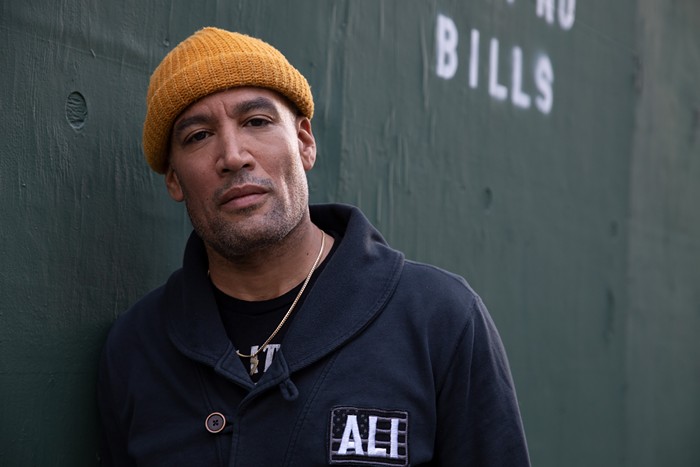"NOBODY IN OUR BAND knows how to play an instrument properly," explains Jamie Barrier of the Pine Hill Haints.
That's not to imply that the Haints are incompetent in their noble artistic pursuit—they're a long-running institution of live band splendor, the only act around who can meld the strident aesthetic of punk rock with the aw-shucks charm of a hayseed-chomping, porch-rattling Southern bluegrass band. For 200-plus shows a year, the Haints make their mark on stages the world over, and while the descriptor "classically trained" is unlikely to stumble from anyone's lips, the self-taught and self-trained Haints are more than apt at creating beauty with a bare-bones setup of misfit instruments—washboard, musical saw, and homemade washtub.
Under the guise of the fictional genre "Alabama ghost country," the Haints have delivered too many recordings (proper LPs, splits with other bands, limited-run vinyl pressings) to accurately count, and if their discography is a mess, the band's transitory lineup is even more bewildering. In addition to Barrier, his wife Kat, Matt Bakula, and Ben Rhyne, the list of honorary Haints is plentiful and geographically scattered throughout the country, which in turn benefits the band.
"Technically, there are four of us, realistically there are six of us, and literally there are 20, I don't know, maybe 30 of us. People who were in the band for a few years, can't play anymore, and are stranded somewhere, we'll pick them up and be like, 'Hey, we'll feed you and pay you if you play for the next few nights,'" says Barrier. This is how the Pine Hill Haints operate—less a tangible band than a roving collective of openhearted musicians, adjusting their lineups as dead-end jobs and geography demand.
Out in October, their third full-length under the K Records shield is Welcome to the Midnight Opry, a lovely 16-song statement of swimmin' hole baptismal hymns, haunted bump-in-the-night country, and a brief taste of calypso stirred in for good measure. Not advisable to bands of lesser stature, Midnight Opry was captured to tape in a single 24-hour span, and then mixed the following day. Its culmination is "You Were Born to Suffer," which is a laconic minute and 11 seconds that says more than most bands can manage in the entirety of their careers. Abridging the phrase "The sacred tree is dead" from Lakota holy man Black Elk, the tune became a call-to-arms for a Southern feud more contagious than any misgivings the Hatfields might have ever had for the McCoys.
For the sake of those unfamiliar with names like Shug Jordan or Bear Bryant, the oak tree at Toomer's Corner in Auburn, Alabama, is the pride of the city's college campus, and a contentious rallying point for the ferocious University of Alabama/Auburn football rivalry. Following an incident where a Crimson Tide alum maliciously gave the tree's roots a fatal dose of herbicide (seriously), "You Were Born to Suffer" became an unofficial anthem of mourning for the Auburn faithful. Even for the Haints—true bastions of the off-the-grid DIY lifestyle—the tree carries immense significance.
"I love punk rock, I love reading Henry Rollins Get in the Van... I like the cover shot, with the police storming the crowd. The closest thing I ever saw to that was the football games when we [Auburn] would play our in-state rivals and they would beat the crap out of us. The first thing they would try to do was go raid the tree... When the Haints first started, we would all go and watch," explains Barrier. "This tree in the middle of this town we come from, people would fight and die for that tree."



















